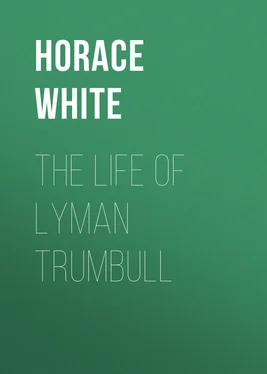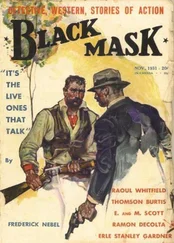Horace White - The Life of Lyman Trumbull
Здесь есть возможность читать онлайн «Horace White - The Life of Lyman Trumbull» — ознакомительный отрывок электронной книги совершенно бесплатно, а после прочтения отрывка купить полную версию. В некоторых случаях можно слушать аудио, скачать через торрент в формате fb2 и присутствует краткое содержание. Жанр: foreign_prose, История, foreign_edu, foreign_antique, на английском языке. Описание произведения, (предисловие) а так же отзывы посетителей доступны на портале библиотеки ЛибКат.
- Название:The Life of Lyman Trumbull
- Автор:
- Жанр:
- Год:неизвестен
- ISBN:нет данных
- Рейтинг книги:5 / 5. Голосов: 1
-
Избранное:Добавить в избранное
- Отзывы:
-
Ваша оценка:
- 100
- 1
- 2
- 3
- 4
- 5
The Life of Lyman Trumbull: краткое содержание, описание и аннотация
Предлагаем к чтению аннотацию, описание, краткое содержание или предисловие (зависит от того, что написал сам автор книги «The Life of Lyman Trumbull»). Если вы не нашли необходимую информацию о книге — напишите в комментариях, мы постараемся отыскать её.
The Life of Lyman Trumbull — читать онлайн ознакомительный отрывок
Ниже представлен текст книги, разбитый по страницам. Система сохранения места последней прочитанной страницы, позволяет с удобством читать онлайн бесплатно книгу «The Life of Lyman Trumbull», без необходимости каждый раз заново искать на чём Вы остановились. Поставьте закладку, и сможете в любой момент перейти на страницу, на которой закончили чтение.
Интервал:
Закладка:
Captain Benoni Trumbull, married to Sarah Drake and settled in Lebanon, Connecticut, had a son, Benjamin, born May 11, 1712.
This Benjamin, married to Mary Brown of Hebron, Connecticut, had a son, Benjamin, born December 19, 1735.
This son was graduated at Yale College in 1759, and studied for the ministry; he was ordained in 1760 at North Haven, Connecticut, where he officiated nearly sixty years, his preaching being interrupted only by the Revolutionary War, in which he served both as soldier and as chaplain. He was the author of the standard colonial history of Connecticut. He was married to Miss Martha Phelps in 1760. They had two sons and five daughters.
The elder son, Benjamin, born in North Haven, September 24, 1769, became a lawyer and married Elizabeth Mather, of Saybrook, Connecticut, March 15, 1800, and settled in Colchester, Connecticut. The wife was a descendant of Rev. Richard Mather, who migrated from Liverpool, England, to Massachusetts in 1635, and was the father of Increase Mather and grandfather of Cotton Mather, both celebrated in the church history of New England. Eleven children were born to these parents, of whom Lyman was the seventh. This Benjamin Trumbull was a graduate of Yale College, representative in the legislature, judge for the probate districts of East Haddam and Colchester, and died in Henrietta, Jackson County, Michigan, June 14, 1850, aged eighty-one. His wife died October 20, 1828, in her forty-seventh year. Lyman Trumbull was thus in the seventh generation of the Trumbulls in America. 8 8 Joseph, the second son of the John above mentioned, who had settled in Suffield, Connecticut, in 1670, removed to Lebanon. He was the father of Jonathan Trumbull (1710-1785), who was governor of Connecticut during the Revolutionary War, and who was the original "Brother Jonathan," to whom General Washington gave that endearing title, which afterwards came to personify the United States as "John Bull" personifies England. (Stuart's Jonathan Trumbull , p. 697.) His son Jonathan (1740-1809) was a Representative in Congress, Speaker of the House, Senator of the United States, and Governor of Connecticut. John Trumbull (1756-1843), another son of "Brother Jonathan," was a distinguished painter of historical scenes and of portraits.
Five brothers and two sisters of Lyman reached maturity. A family of this size could not be supported by the fees earned by a country lawyer in the early part of the nineteenth century. The only other resource available was agriculture. Thus the Trumbull children began life on a farm and drew their nourishment from the soil cultivated by their own labor. It is recorded that, although the father and the grandfather of Lyman were graduates of Yale College, chill penury prevented him from having similar advantages of education. His schooling was obtained at Bacon Academy, in Colchester, which was of high grade, and second only to Yale among the educational institutions of the state. Here the boy Lyman took the lessons in mathematics that were customary in the academies of that period, and became conversant with Virgil and Cicero in Latin and with Xenophon, Homer, and the New Testament in Greek.
The opportunities to put an end to one's existence are so common to American youth that it is cause for wonder that so many of them reach mature years. Young Trumbull was not lacking in such facilities. The following incident is well authenticated, being narrated in part in his own handwriting:
When about thirteen years old he was playing ball one cold day in the family yard. The well had a low curbing around it and was covered by a round flat stone with a round hole in the top of it. He ran towards the well for the ball, which he picked up and threw quickly. As he did so his foot slipped on the ice and he went head first down the well. His recollection of the immediate details is vague, but he did not break his neck or stun himself on the rocky sides, but appears to have gone down like a diver, and somehow managed to turn in the narrow space and come up head first. The well had an old-fashioned sweep with a bucket on it, which his brothers promptly lowered and he was hoisted out, drenched and cold, but apparently not otherwise injured.
He attended school and worked on the farm until he was eighteen years of age when he earned some money by teaching the district school one year at Portland, Connecticut. At the age of nineteen he taught school one winter in New Jersey, returning to Colchester the following summer. He had established a character for rectitude, industry, modesty, sobriety, and good manners, so that when, in his twentieth year (1833), he decided to go to the state of Georgia to seek employment as a school-teacher, nearly all the people in the village assembled to wish him godspeed on that long journey, which was made by schooner, sailing from the Connecticut River to Charleston, South Carolina. The voyage was tempestuous but safe, and he arrived at Charleston with one hundred dollars in his pocket which his father had given him as a start in life. This money he speedily returned out of his earnings because he thought his father needed it more than himself.
A memorandum made by himself records that "on the evening of the day when he arrived at Charleston a nullification meeting was held in a large warehouse. The building was crowded, so he climbed up on a beam overhead and from that elevated position overlooked a Southern audience and heard two of the most noted orators in the South, Governor Hayne, and John C. Calhoun, then a United States Senator. He remembers little of the impression they made upon a youth of twenty, except that he thought Hayne an eloquent speaker."
From Charleston he went by railroad (the first one he had ever seen and one of the earliest put in operation in the United States) to a point on the Savannah River opposite Augusta, Georgia, and thence by stage to Milledgeville, which was then the capital of Georgia. From Milledgeville he walked seventy-five miles to Pike County, where he had some hope of finding employment. Being disappointed there he continued his journey on foot to Greenville, Meriwether County, where he had more success even than he had expected, for he obtained a position as principal of the Greenville Academy at a salary of two hundred dollars per year in addition to the fees paid by the pupils. This position he occupied for three years.
While at Greenville he employed his leisure hours reading law in the office of Hiram Warner, judge of the superior court of Georgia, afterwards judge of the supreme court of the state and member of Congress. In this way he acquired the rudiments of the profession. As soon as he had gained sufficient capital to make a start in life elsewhere, he bought a horse, and, in March, 1837, took the trail through the "Cherokee Tract" toward the Northwest. This trail was a pathway formed by driving cattle and swine through the forest from Kentucky and Tennessee to Georgia. Dr. Parks, of Greenville, accompanied Trumbull during a portion of the journey. They traveled unarmed but safely, although Trumbull carried a thousand dollars on his person, the surplus earnings of his three years in Georgia. For a young man of twenty-four years without a family this was affluence in those days.
Through Kentucky, Trumbull continued his journey without any companion and made his entrance into Illinois at Shawneetown, on the Ohio River, where he presented letters of introduction from his friends in Georgia and was cordially welcomed. After a brief stay at that place he continued his journey to Belleville, St. Clair County, bearing letters of introduction from his Shawneetown friends to Adam W. Snyder and Alfred Cowles, prominent members of the bar at Belleville. Both received him with kindness and encouraged him to make his home there. This he decided to do, but he first made a visit to his parental home in Colchester, going on horseback by way of Jackson, Michigan, near which town three of his older brothers, David, Erastus, and John, had settled as farmers.
Читать дальшеИнтервал:
Закладка:
Похожие книги на «The Life of Lyman Trumbull»
Представляем Вашему вниманию похожие книги на «The Life of Lyman Trumbull» списком для выбора. Мы отобрали схожую по названию и смыслу литературу в надежде предоставить читателям больше вариантов отыскать новые, интересные, ещё непрочитанные произведения.
Обсуждение, отзывы о книге «The Life of Lyman Trumbull» и просто собственные мнения читателей. Оставьте ваши комментарии, напишите, что Вы думаете о произведении, его смысле или главных героях. Укажите что конкретно понравилось, а что нет, и почему Вы так считаете.












